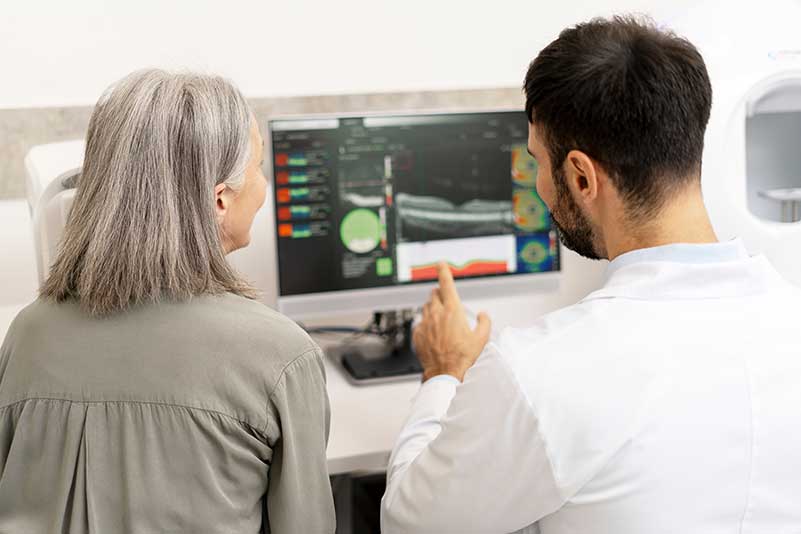What is a OCT Scan ?
At Dyer and Scott we’re committed to providing our patients with the latest in eye health technology. One of the advanced tools we use to help safeguard your vision is Optical Coherence Tomography (OCT). OCT is a non-invasive imaging technique that offers a highly detailed view of the retina and other critical structures of your eye, enabling us to detect eye conditions early—often before symptoms are even noticeable.
Optical Coherence Tomography, or OCT, is an advanced imaging test that uses light waves to capture cross-sectional images of the retina, the layer of tissue at the back of the eye responsible for processing light and sending visual information to the brain. Similar to an ultrasound, but using light instead of sound waves, OCT provides an in-depth look at each layer of the retina and optic nerve, allowing us to monitor for subtle changes in your eye health over time.
Why do I Need an OCT Scan?
Routine eye exams are crucial, but some eye conditions can progress without obvious signs or symptoms. OCT technology allows us to detect early changes, even at a microscopic level, making it invaluable in diagnosing and managing various eye conditions, such as:
- Glaucoma: Detects changes in the optic nerve, which are early signs of glaucoma, a condition that can lead to vision loss if untreated.
- Macular Degeneration: Monitors for any changes in the macula, a key part of the retina responsible for sharp central vision, which can indicate the onset of age-related macular degeneration (AMD)
- Retinal Detachments and Holes: Shows the structure and integrity of the retina, which can help detect conditions like retinal detachment or macular holes.
- General Eye Health Monitoring: OCT is also used to monitor subtle changes over time, giving us the ability to track your eye health as you age.

Who Benefits from an OCT Scan?
While OCT is a valuable tool for everyone, it is especially beneficial for individuals who:
- Have a family history of glaucoma, macular degeneration, or other eye conditions.
- Are over the age of 40, when the risk for conditions like glaucoma and AMD increases.
- Are diabetic or at risk of diabetes, as diabetic retinopathy can develop without early warning signs.
- Have experienced changes in vision, such as blurred or distorted vision.

Useful Information
Take a look at some of the most frequently asked questions relating to eye care services at Dyer & Scott. If your question is not answered here, please reach out to us and we would be happy to help.
Pop into one of our practices to talk to us face to face or call us on the below numbers.
Clifton: 0117 973 7667
Portishead: 01275 842 504
Yes – as well as checking for a range of eye conditions that may not be under review at the hospital, it will provide an up to date appraisal of your eye health. Your optician does not usually have access to the results from your hospital examinations and the scan will give a more rounded analysis of your eye health.
An OCT scan is not painful in the slightest. It is a quick, painless procedure that scans your eye without touching it. It is just like having a photo taken.
OCT scans are recommended for anyone aged 25 or older. It’s really helpful for your optician to take readings and track them every time you come in and see us in order to best safeguard your eye health.
None. OCT uses a completely safe laser light source, so there are no side effects or risks associated with an OCT procedure.
